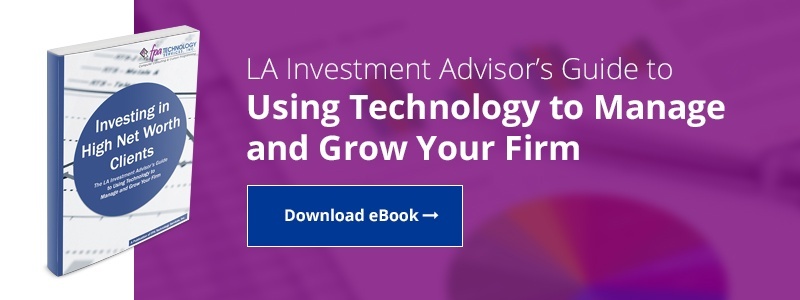 As a Los Angeles based Investment Advisor, your clients look to you to manage a significant portion, or even sometimes all, of their investment portfolios. At the same time, it goes without saying that they’re looking to you to take care of and secure their information between every consultation. Therefore, any bad habits threatening your firm’s data security are also threatening the livelihood of your clients, potentially affecting their trust in you while potentially damaging your reputation.
As a Los Angeles based Investment Advisor, your clients look to you to manage a significant portion, or even sometimes all, of their investment portfolios. At the same time, it goes without saying that they’re looking to you to take care of and secure their information between every consultation. Therefore, any bad habits threatening your firm’s data security are also threatening the livelihood of your clients, potentially affecting their trust in you while potentially damaging your reputation.
Data security is not just about protecting your firm’s information, but also about ensuring that your clients’ data is equally safe. It’s time to banish those bad habits for good. Here are 5 bad habits that we’ve seen way too often...
1. Ignoring the necessity for a Disaster Recovery Plan
Perhaps less about data security in the first instance, and more about looking after your company’s interests in the event of catastrophe, ignoring the need for a disaster recovery plan is almost like willing a fresh catastrophe to strike. Whether it’s a direct cyber-attack, a natural disaster, or old-fashioned theft or fraud, your systems will be at their most vulnerable immediately following such misfortune.
It is essential, therefore, to ensure that you have a disaster recovery plan in place so that data and equipment can be recovered or repaired and that any untouched data is protected from further attack or damage. When was the last time you backed up your files? When was the last time you tested the backup? Do you have an emergency security strategy? Do you know what to do if everything came to a screeching halt? If you’re unsure of any of this, now is the time to find out.
2. Neglecting to backup data
As an LA Investment Advisor, there’s a good chance that you house a lot of data on your computer systems, including personal details, company stats and employee information, and data pertaining to your partners and clients. That’s a lot of data to throw away, right? Every time you neglect to back that data up to an encrypted hard drive, or at least save multiple copies, you may as well be dangling it out the window for the nearest person to see. With the growing prevalence of cloud data backup there has never been a better time to ensure your most sensitive date is kept safe and sound – and easily recoverable after a catastrophic event.
3. Failing to encrypt files, or use encrypted USB devices
Just as it’s important to save important documents and create copies, it’s also essential that all sensitive data be encrypted to protect it. You may have secured your information from prying eyes, but what happens when falls into the wrong hands? Have you done everything to protect it then?
Similarly, you should pay attention to the use of USB devices. How many times have you heard of such devices going missing or being stolen? Neglecting to password protect and encrypt documents is a particularly lazy bad habit. Your clients trust you with their information. At a minimum, the SEC looks to an Investment Advisory firm to ensure they’re doing their due diligence in doing all that they “reasonably” can to protect their clients’ information. And you need to be giving that data a fighting chance of surviving the threat of a cyber-attack or good old human error.
4. Accessing unsecured Wi-Fi networks when on the go
LA is a city constantly on the go. And it’s almost a given that you’ll be accessing your information between meetings, during a quick coffee break, or on your commute in and out of the office. However, by signing up to unsecured public access Internet, you’re tempting a host of hackers and cyber criminals and offering up sensitive investment data. Never access the Internet or attempt to view work documents when you’re in a public space without a certain level of security. Two factor authorization (2FA) helps ensure that only secure users are accessing your network resources remotely.
5. Being blasé about security in general
There’s no getting around it: being blasé about data security is the number one bad habit that any LA Investment Advisor could have. And is, essentially, akin to pretending not to care about your clients’ best interests. According to recent reports, some 45% of IT staff members admit to circumventing security, and employees often represent the greatest security risk to data, although not always knowingly, by not taking care – or simply by assuming that such things won’t happen to them. Now is the time to educate your team and to make sure you’re being responsible for the data you’ve been entrusted with.
So, there you have it. Naturally, this list isn’t all inclusive. But, we do believe it’s a great place to start. You should review it and add to it with your own ideas of what constitutes a bad habit that you need to address as soon as "reasonably" possible. The last thing you want to do is look back with regret AFTER it’s too late.
Is there anything not listed that you feel you’d do well to put behind you? We’d love to hear youor thoughts on this topic, so please share it in the Comments box below.
And to follow-through on the concepts introduced here, be sure to download your free guide, Investing in High Net Worth Clients: The LA Investment Advisor's Guide to Using Technology to Manage and Grow Your Firm.
/fpa-logo-tagline.gif)






